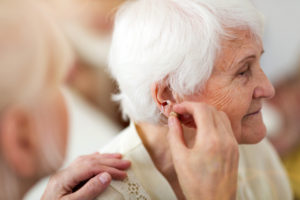 Experts agree that Alzheimer’s disease and dementia risk could be influenced by hearing loss. Among older adults, sound is important for stimulating the brain, and studies show the profound effect it has on health.
Experts agree that Alzheimer’s disease and dementia risk could be influenced by hearing loss. Among older adults, sound is important for stimulating the brain, and studies show the profound effect it has on health.
There are many theories behind the relationship between hearing loss and dementia. Some experts believe that dementia creates certain conditions that may affect the ability to hear, while others believe it could be the reverse, with hearing loss impairing the brain’s ability to function. While more research is needed to understand the exact relation between the two, it is important to note the connection.
Advertisement
“If you break down what hearing is, it is a major component in our ability to connect with the rest of the world,” said Nicholas Reed, an audiologist and core faculty member at the Cochlear Center for Hearing and Public Health at Johns Hopkins Bloomberg School of Public Health in Baltimore.
Hearing loss is “highly related to social isolation and loneliness,” he said, “and we’ve known for a long time that social isolation and loneliness are related to important age-related health outcomes like dementia and cognitive decline.”
Reed is part of a John Hopkins team that is looking at the potential of hearing treatments to reduce cognitive decline in older adults. The study will span a few years and researchers hope to conclude whether hearing aids can help with cognitive decline.
But not everyone with mild hearing loss needs a hearing aid right away, he said. “You very much may be able to get by adjusting the way you live your life. Making sure you face sounds you want to hear, making sure you’re avoiding background noise for important conversations, and use simple amplifiers to help in more difficult situations.”
Impact on Quality of Life
In the United States, one in three people between the ages of 65 and 74 has a hearing impairment, according to the National Institutes of Health. It can be caused by a range of different health conditions, but no matter the cause, research shows how it can increase the risk of Alzheimer’s disease and dementia. This is just one example of how hearing loss can impact your quality of life.
Advertisement
According to the Centers for Disease Control and Prevention, five million adults in the United States are living with Alzheimer’s disease and related dementias. This number is expected to grow to 13.9 million, or roughly 3.3% of the population, by 2060.
Doctors advise people to start getting regular hearing checks in their 60s and to use earplugs at loud sporting events or concerts, regardless of age. Staying healthy overall, through getting plenty of exercise and preventing high blood pressure, may also affect hearing health. Taking care of yourself and your hearing through all stages of life could help to reduce the risk of Alzheimer’s disease or dementia later life.
“In terms of health, the primary concern as we go through aging, is to maintain our ability to function independently as much as possible, and hearing is one of the central elements of this,” said Dr. Costantino Ladecola, director of the Feil Family Brain and Mind Research Institute at Weill Cornell Medical College in New York City.
